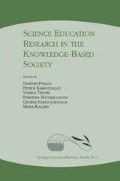Abstract
Different cases of physics instructor’s implementations of Microcomputer Based Laboratory (MBL) in physics teaching have been studied. When implemented as a technological tool only poor learning results were observed while when MBL were used as both a technological and cognitive tool good learning results were observed. New technology thus does not necessarily lead to better learning. When developing and implementing computer aided learning we must focus as much on the cognitive aspects as on the technological aspects. Also we must focus on instructor’s conceptions of teaching and learning since this affects their understanding of curricular reforms and lead to transformations of original developers educational intentions.
Supported in part by the Swedish National Agency for Higher Education, Council for Renewal of Higher Education. Part of this work was done while the author was employed at Högskolan Dalarna.
Access this chapter
Tax calculation will be finalised at checkout
Purchases are for personal use only
Preview
Unable to display preview. Download preview PDF.
References
Bernhard J. (2000a). Teaching engineering mechanics courses using active engagement methods. Proc. of PTEE2000, Budapest, June, 2000.
Bernhard J.(2000b). Improving engineering physics teaching — learning fr om physics education research. Proc. of PTEE 2000, Budapest, June, 2000.
Bernhard J. (2001). Does active engagement curricula give long-lived conceptual understanding? In Pinto, R. & Surinach, S. (eds), Physics Teacher Education Beyond 2000 (pp 749 — 752). Elsevier, Paris.
Euler M. & Müller A. (1999). Physics learning and the computer: A review, with a taste of meta-analysis. In Komorek, M. et al.: Proceedings Second International Conference of the European Science Education Research Association.
Hake, R. R. (1997). Interactive-engagement vs traditional methods: A six-thousand-student survey of mechanics test data for introductory physics courses. Am J Physics, 66, 64–74.
Hamne, P. & Bernhard J. (2001). Educating pre-service teachers using hands-on and microcomputer based labs as tools for concept substitution. In Pinto, R. & Surinach, S. (eds): Physics Teacher Education Beyond 2000 (pp 663 — 666). Elsevier, Paris,.
Hestenes, D. Wells, M. & Swackhamer, G. (1992). Force Concept Inventory. The Phys Teacher, 30, 141— 158. (Translated into Swedish by J Bernhard, 1997).
Laws, P. L. (1997). A New order for Mechanics. In: Wilson, J. (ed.), Proc. Conf. on Intro Physics Course (pp. 125–136). Wiley, New York.
McDermott, L. C. (1997). How research can guide us in improving the introductory course. In: Wilson, J. (ed.), Proc. Conf. on Intro Physics Course (pp 33–45). Wiley, New York,.
Sassi, E. (2001). Lab-work in physics education and informatic tools: advantages and problems. In: Pinto, R. & Surinach, S. (eds), Physics Teacher Education Beyond 2000 (pp 57 — 64). Elsevier, Paris.
Sokoloff, D. R. Thornton, R. K. & Laws, P. W. (1998). RealTime Physics. Wiley, New York.
Thornton, R. K. (1987). Tools for scientific thinking — microcomputer-based laboratories for teaching physics. Phys Ed, 22, 230–238.
Thornton, R. K. (1989), Tools for scientific thinking, Learning physical concepts with real-time laboratory measurements tools. In: Redish (ed.) Proc Conf Computers in Physics Instruction (pp 177–189). Addison Wesley, Reading.
Thornton, R. K. (1997a). Learning Physics Concepts in the Introductory Course: Microcomputer-based Labs and Interactive Lecture Demonstrations. In: Wilson J (ed.), Proc Conf on Intro Physics Course (pp. 69–86). Wiley, New York.
Thornton, R. K. (1997b). Conceptual Dynamics: Following Changing Student Views of Force and Motion. In: Redish & Rigden (eds), AIP Conference Proceedings 399 (pp. 913 — 934). New York, American Institute of Physics.
Thornton, R. K. & Sokoloff, D. R. (1998). Assessing student learning of Newton’s laws, The Force and Motion Conceptual Evaluation and the evaluation of active learning laboratory and lecture curricula, Am JPhysics, 66, 338–352. (Translated into Swedish by J Bernhard, 1998).
Tinker, R. F. (ed.),(1996). Microcomputer-Based Labs: Educational Research and Standards. NATO ASI Series F, 156, 1996, Springer, Berlin.
Author information
Authors and Affiliations
Editor information
Editors and Affiliations
Rights and permissions
Copyright information
© 2003 Springer Science+Business Media Dordrecht
About this chapter
Cite this chapter
Bernhard, J. (2003). Physics Learning and Microcomputer Based Laboratory (MBL) Learning Effects of Using MBL as a Technological and as a Cognitive Tool. In: Psillos, D., Kariotoglou, P., Tselfes, V., Hatzikraniotis, E., Fassoulopoulos, G., Kallery, M. (eds) Science Education Research in the Knowledge-Based Society. Springer, Dordrecht. https://doi.org/10.1007/978-94-017-0165-5_34
Download citation
DOI: https://doi.org/10.1007/978-94-017-0165-5_34
Publisher Name: Springer, Dordrecht
Print ISBN: 978-90-481-6337-3
Online ISBN: 978-94-017-0165-5
eBook Packages: Springer Book Archive

